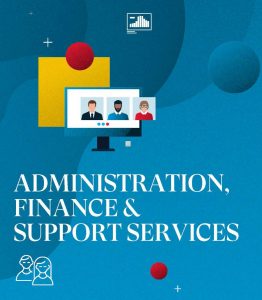- The Laboratory
- Organization
- Departments
- Jobs
- Analysis book
- Contact
- News
- Publications
- Download


![[Annual Report 2020] WHEN BASIC PRODUCTS BECOME SCARCE OVERNIGHT: HOW THE LNS REORGANISED ITS SUPPLY CHAIN MANAGEMENT DURING THE CRISIS](https://lns.lu/wp-content/uploads/2021/12/new.jpg)
In order for a healthcare player like the LNS to fulfil its central role in times of crisis, many competencies are required. At the centre of it all, of course, are the different health experts. However, their contribution to the handling of the COVID-19 crisis would not have been possible without expertise in the fields of Human Resources, Information Technology, Infrastructure & Logistics and Finance.
In times of crisis, some consumables become scarce. During the COVID-19 crisis, this was of course especially true for products for the health sector – including so-called personal protective equipment (PPE). For the LNS’s logistics experts, this meant a change – sometimes even a complete reorganisation of the supply chain.
| “The COVID-19 crisis caught us cold with regard to our available stocks,” says Thomas Wegner, Head of Infrastructure & Logistics. “Like other industries, we came to realise almost overnight that the principle of just-in-time stock management does not work in times of shortage.” And shortages, Thomas Wegner continues, sprung up time and again over the course of 2020 – for several articles, and worldwide. |
 Thomas Wegner |
In the beginning, Thomas Wegner remembers, it was mainly protective masks of all kind that were lacking in many places – including at the LNS: “When COVID-19 broke out, established wholesalers for laboratory supplies, with whom we had always worked until then, suddenly could no longer meet the demand for masks. Especially in Europe, the market was almost sold out, the result being that we even had to ‘ration’ the masks we distributed internally.”
The situation finally improved when new, smaller distributors appeared on the scene who bought their masks directly from Asia. However, even this solution was not an automatic success: “We first had to distinguish the serious from the less serious suppliers and then establish new business relationships in the shortest amount of time. With a mixture of reactivity, gut feeling and a well experienced team, we succeeded in the end in always having enough masks available for our employees at all times.”
That this had its price goes without saying – the keywords here being “supply and demand”. In the meantime, according to Thomas Wegner, prices had “gone through the roof” – for masks as well as for other articles. In any case, PPE products became scarce from time to time as 2020 went on, with the same consequences for the LNS: new suppliers had to be found around the globe – whose products needed to meet requirements for quality, delivery times and price.
Thomas Wegner: “In summer, for example, there was a shortage of gloves, without which no laboratory operation is conceivable. In some cases, special activities require special gloves that have to be tested according to the relevant standards. Here too, we had to find new suppliers in a hurry, just as we had to find new suppliers for swabs and pipette tips in autumn. In both cases we found what we were looking for at the source, i.e. in South Korea and China respectively – and ordered large quantities there.”
With this double strategy, consisting of cooperation with various small, local suppliers and direct contact with China and South Korea, the LNS was prepared for its ever-increasing testing activities and got through the winter. In addition, Thomas Wegner says that a general lesson for supply chain management was learned from the “COVID-19 economy”: “Relying on wholesalers may be convenient, but in the end it’s a well-balanced supplier portfolio that makes the difference.”
Download the LNS Annual Report 2020: https://lns.lu/publication/annual-report-2020/
